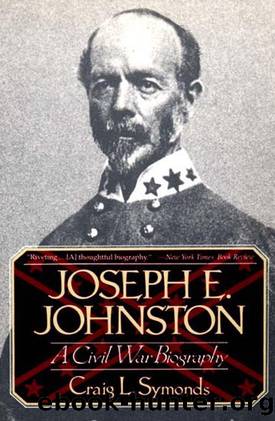Joseph E. Johnston: A Civil War Biography (Norton Paperback) by Craig L. Symonds

Author:Craig L. Symonds [Symonds, Craig L.]
Language: eng
Format: azw3
Publisher: W. W. Norton & Company
Published: 1994-06-17T00:00:00+00:00
CHAPTER SEVENTEEN
The Army of Tennessee
Two days after Christmas, 1863, Joseph E. Johnston announced to the Army of Tennessee that he was its new commander. That same day he conducted an informal review of his new command by riding through the camps. One soldier, looking up from the ranks, later described what he saw:
Fancy, if you please, a man about fifty years old, rather small of stature, but firmly and compactly built, an open and honest countenance, and a keen but restless black eye, that seemed to read your very inmost thoughts. In his dress he was a perfect dandy. He ever wore the very finest clothes that could be obtained, carrying out in every point the dress and paraphernalia of the soldier. . . . His hat was decorated with a star and feather, his coat with every star and embellishment, and he wore a bright new sash, big gauntlets, and silver spurs. He was the very picture of a general.1
By all accounts Johnstonâs arrival in Dalton elicited near-unanimous approval from the men in the ranks. They cheered him heartily and Johnston responded, as one officer recalled, âby darting out on his bright bay horse in front of the line & lifting his hat, not merely off his head, but down to his stirrup.â For many, perhaps, the news that Bragg was not going to return was as cheering as the intelligence that Johnston was to replace him. But for most, Johnstonâs reputation, his imposing presence, and especially his manifest concern for his men generated genuine enthusiasm. From the very beginning, Johnston set a completely different tone in the army. The troops learned quickly that their well-being was the new commanderâs first priority; he was, as one put it, a âfeeding general.â2
From his earliest days as a professional officer, Johnston had made the care and feeding of his men his highest priority. In Dalton, he started by ordering that two days rations be issued to the troops at once. In place of the ancient beef, so rancid and slippery that the men called it, accurately, âblue beef,â he ordered the commissary to distribute the small reserves of bacon and sugar, and he announced that tobacco and whiskey would be issued twice a week. Of course, without a dramatically improved supply system, this gesture would have been a very temporary solution, for he would have had to fall back on the detested âblue beefâ within a matter of days. So his first administrative efforts were aimed at improving the flow of goods and supplies to the army. In addition, he ordered new uniforms, tents, and especially shoes, for much of the army was barefoot. He offered universal, unconditional amnesty to those who were absent without leave, and ordered that the men who had remained be granted furloughsâone third of the army at a timeâuntil every soldier had had a chance to go home. Soldiers drew furloughs by lot, and the lucky ones if they wished could sell or give their draw to a family man.
Download
This site does not store any files on its server. We only index and link to content provided by other sites. Please contact the content providers to delete copyright contents if any and email us, we'll remove relevant links or contents immediately.
| Africa | Americas |
| Arctic & Antarctica | Asia |
| Australia & Oceania | Europe |
| Middle East | Russia |
| United States | World |
| Ancient Civilizations | Military |
| Historical Study & Educational Resources |
The Dawn of Everything by David Graeber & David Wengrow(1691)
The Bomber Mafia by Malcolm Gladwell(1620)
Facing the Mountain by Daniel James Brown(1545)
Submerged Prehistory by Benjamin Jonathan; & Clive Bonsall & Catriona Pickard & Anders Fischer(1452)
Wandering in Strange Lands by Morgan Jerkins(1419)
Tip Top by Bill James(1409)
Driving While Brown: Sheriff Joe Arpaio Versus the Latino Resistance by Terry Greene Sterling & Jude Joffe-Block(1364)
Red Roulette : An Insider's Story of Wealth, Power, Corruption, and Vengeance in Today's China (9781982156176) by Shum Desmond(1350)
Evil Geniuses: The Unmaking of America: A Recent History by Kurt Andersen(1345)
The Way of Fire and Ice: The Living Tradition of Norse Paganism by Ryan Smith(1324)
American Kompromat by Craig Unger(1307)
It Was All a Lie by Stuart Stevens;(1294)
F*cking History by The Captain(1289)
American Dreams by Unknown(1277)
Treasure Islands: Tax Havens and the Men who Stole the World by Nicholas Shaxson(1254)
Evil Geniuses by Kurt Andersen(1249)
White House Inc. by Dan Alexander(1206)
The First Conspiracy by Brad Meltzer & Josh Mensch(1167)
The Fifteen Biggest Lies about the Economy: And Everything Else the Right Doesn't Want You to Know about Taxes, Jobs, and Corporate America by Joshua Holland(1115)
